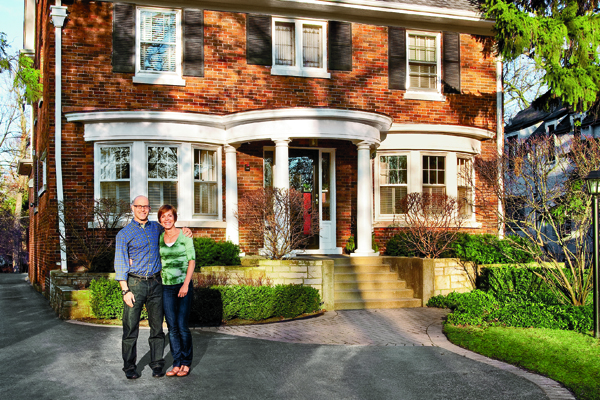
Jonathan and Carolyn Singer expanded their Highland Park house after her father came to live with them.
Donna and Rich Ringelstein paid $77,000 for their brand-new four-bedroom colonial in Naperville in 1977. Thirty years later, with their two sons grown and Rich retired from the catering business, the couple planned a move to coastal North Carolina. They put the house on the market, but nothing happened, even after they cut the price from $345,000 to $295,000. "It's frustrating," Donna says. "After all the money we've put into this house over the years, to have it just sit here."
That feeling resonates with countless local homeowners–the sense of being locked into a home that no longer suits their needs. Exasperation has only heightened as house prices continue to drop. As the charts beginning on page 64 show, home values fell in 81 percent of Chicago neighborhoods that had at least 20 sales in 2011. They fell in 87 percent of suburbs. Even most communities that showed improvement last year have a ways to go to get back to 2006 levels, the peak year for housing in much of the metro area. According to Midwest Real Estate Data, the typical home in the Chicago metro area–plus DeKalb, Grundy, and Kendall Counties–is still worth 35 percent less today than it was in 2006.
Zillow, the online real-estate tracker, projects that median home prices will continue to decline nationwide by 3.7 percent in 2012. In the Chicago area, the forecast is even worse, with Zillow predicting a median 7.6 percent drop; among the 25 biggest markets, that's second only to Atlanta. What's more, the company doesn't expect the housing market to bottom out anytime before 2013.
The silver lining: Because fewer new homes are being built, contractors are eager for business. So redoing your place to make it more like your dream home is cheaper than it's been in years. According to Remodeling magazine, the costs of home improvements decreased over the last three years, falling by 6.9 percent in 2009, 2.3 percent in 2010, and about 2 percent last year. For the fourth quarter of 2011, the National Association of Home Builders reported that its members saw remodeling activity reach its highest level in the past five years.
But in this economic climate, as you embark on improving your home, you would be wise to select upgrades that maximize your chances of eventually selling the place quickly and for top dollar. Think tactically: What does your house need now–and what can you afford? "Are you hoping to get a payback on doing this, or is it an investment just for your family's enjoyment?" asks Bob Floss, the suburban real-estate agent and former homebuilder who currently serves as president of the Chicago Association of Realtors.
You want to make sure your home compares well with neighboring properties, but in these budget-conscious days, that doesn't mean overloading the kitchen and baths with granite. "Buyers aren't expecting to see that glamour now," Floss says. "They want it to look good, but they're not impressed by the flashy toys. That says expensive, and everyone's a value shopper now."
The specific upgrades you should make depend on your situation. Some people want to sell immediately, others hope to sell in a few years, and still others are happy to stay put for another decade or more. To formulate home improvement strategies for each of those groups, I talked with real-estate agents, builders, and other housing experts. Their advice will help you map out a smart plan for fixing up your house to meet your needs today–and whatever demands come tomorrow.
-
If you want to …
Sell this summer -
If you want to …
Sell in a few years -
If you want to …
Stay for a decade-plus
Photograph: Mike Schwartz



Comments are closed.